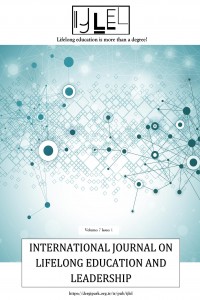Promotion of hygiene habits at school – An adaptation of a project from Classroom Learning to Distance Learning
Öz
Due to the COVID-19 pandemic and the challenges it brought to the portuguese education system, there
was a need of adapting a research project to be carried out in a school environment. Prior to the
conception of the project, a problem was identified in a class of 24 students in 1st grade: a lack of hygiene
habits of the students' hands. Therefore, an opportunity to create a project was identified, being its main
goal to improve students' hygiene habits, with a focus on hand washing. The project became even more
relevant due to the COVID-19 pandemic and the urgent need of proper hand washing habits.
Simultaneously, the research project also aimed at creating alerts and warnings at school, related to
proper hand hygiene practices. For the data gathering, the main instruments used were an initial and
final questionnaire to the students, an interview with the teacher in charge of the class, as well as
observation records, based on the students' dialogues and productions. Therefore, this is a research
project of a mixed nature (qualitative and quantitative).
Anahtar Kelimeler
Kaynakça
- Andrade, M. I. (1995). Educação para a saúde: guia para professores e educadores. Lisboa: Texto Editora.
- Associação Nacional de Controlo de Infeção (2015). Higiene das Mãos. Available at: http://www.anci.pt/higiene-das-m%C3%A3os.
- Carmo, H., & Ferreira, M. M. (1998). Metodologia da investigação: guia para auto-aprendizagem. Lisboa: Universidade Aberta.
- Couto, I. , Cunha, S., Neto, S., & Soares, M. (2012). Hábitos de higiene corporal e higienização das mãos – Um projeto de intervenção em contexto escolar. Internship report. Polytechnic Health Institute of North, Vale do Sousa, Portugal.
- Doyle, L., Brady, A., Byrne, G. (2009). An overview of mixed methods research. Journal of Research in Nursing, 14 (2), 175-185. Available at: https://journals.sagepub.com/doi/abs/10.1177/1744987108093962.
- Estêvão, M. (2015). Higienização das Mãos: Uma Precaução Básica na Prevenção da Infeção. Project report. Polytechnic Institute of Setúbal, Setúbal, Portugal.
- Kawulich, B. B. (2005). Participant Observation as a Data Collection Method. Forum: Qualitative Sozialforschung/Forum: Qualitative Social Research [On-line Journal], 6(2), Art. 43. Available at: http://www.qualitative-research.net/fqs-texte/2-05/05-2-43-e.htm.
- Lopes, J. B., Cravino, J., Cruz, E., & Barbot, A. (2017). Teaching Science: Contributions of Research for Planning, Practice and Professional Development. ed. 1, ISBN: 978-1-53612381-4. New York: Nova Science.
- Lopes, J. B., Viegas, M. C., & Pinto, J. A. (2019). Multimodal Narratives in Research and Teaching Practices. Hershey: IGI Global.
- Rema, D. (2017). Vamos lavar as mãos! Um Estudo sobre a Aquisição de Hábitos de Higiene em Creche. Dissertação de mestrado. Instituto Superior de Educação e Ciências, Lisboa, Portugal.
- World Health Organization. (2020). Who save lives: clean your hands in the context of Covid-19. Available at: https://www.who.int/infection-prevention/campaigns/clean-hands/WHO_HH-CommunityCampaign_finalv3.pdf?fbclid=IwAR3PGCbYZtdPDlP7cD1vPccl1oF1zbgYOpiIynOUQPJGtXMvnSMltVY750.
Öz
Kaynakça
- Andrade, M. I. (1995). Educação para a saúde: guia para professores e educadores. Lisboa: Texto Editora.
- Associação Nacional de Controlo de Infeção (2015). Higiene das Mãos. Available at: http://www.anci.pt/higiene-das-m%C3%A3os.
- Carmo, H., & Ferreira, M. M. (1998). Metodologia da investigação: guia para auto-aprendizagem. Lisboa: Universidade Aberta.
- Couto, I. , Cunha, S., Neto, S., & Soares, M. (2012). Hábitos de higiene corporal e higienização das mãos – Um projeto de intervenção em contexto escolar. Internship report. Polytechnic Health Institute of North, Vale do Sousa, Portugal.
- Doyle, L., Brady, A., Byrne, G. (2009). An overview of mixed methods research. Journal of Research in Nursing, 14 (2), 175-185. Available at: https://journals.sagepub.com/doi/abs/10.1177/1744987108093962.
- Estêvão, M. (2015). Higienização das Mãos: Uma Precaução Básica na Prevenção da Infeção. Project report. Polytechnic Institute of Setúbal, Setúbal, Portugal.
- Kawulich, B. B. (2005). Participant Observation as a Data Collection Method. Forum: Qualitative Sozialforschung/Forum: Qualitative Social Research [On-line Journal], 6(2), Art. 43. Available at: http://www.qualitative-research.net/fqs-texte/2-05/05-2-43-e.htm.
- Lopes, J. B., Cravino, J., Cruz, E., & Barbot, A. (2017). Teaching Science: Contributions of Research for Planning, Practice and Professional Development. ed. 1, ISBN: 978-1-53612381-4. New York: Nova Science.
- Lopes, J. B., Viegas, M. C., & Pinto, J. A. (2019). Multimodal Narratives in Research and Teaching Practices. Hershey: IGI Global.
- Rema, D. (2017). Vamos lavar as mãos! Um Estudo sobre a Aquisição de Hábitos de Higiene em Creche. Dissertação de mestrado. Instituto Superior de Educação e Ciências, Lisboa, Portugal.
- World Health Organization. (2020). Who save lives: clean your hands in the context of Covid-19. Available at: https://www.who.int/infection-prevention/campaigns/clean-hands/WHO_HH-CommunityCampaign_finalv3.pdf?fbclid=IwAR3PGCbYZtdPDlP7cD1vPccl1oF1zbgYOpiIynOUQPJGtXMvnSMltVY750.
Ayrıntılar
| Birincil Dil | İngilizce |
|---|---|
| Konular | Eğitim Üzerine Çalışmalar |
| Bölüm | Araştırma Makalesi |
| Yazarlar | |
| Yayımlanma Tarihi | 30 Haziran 2021 |
| Gönderilme Tarihi | 28 Eylül 2020 |
| Yayımlandığı Sayı | Yıl 2021 Cilt: 7 Sayı: 1 |

